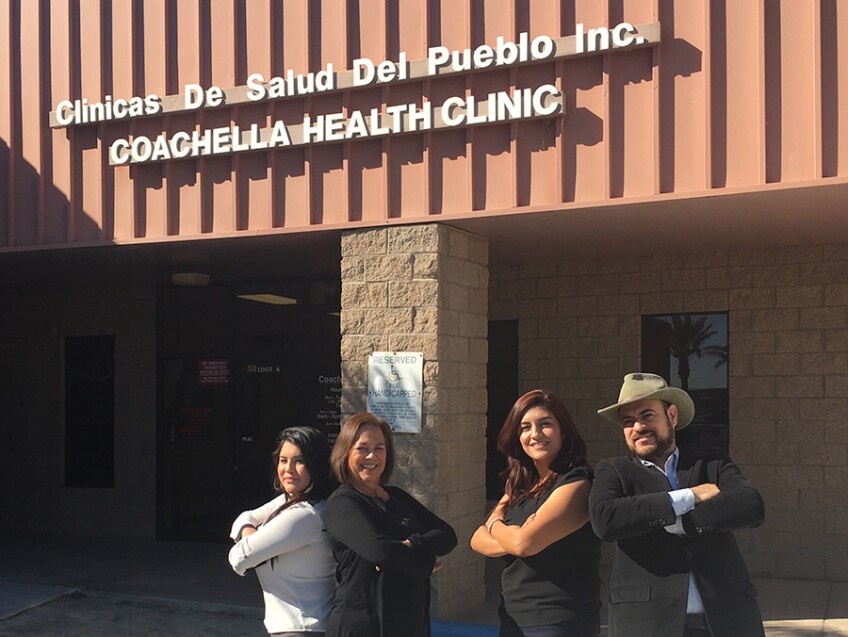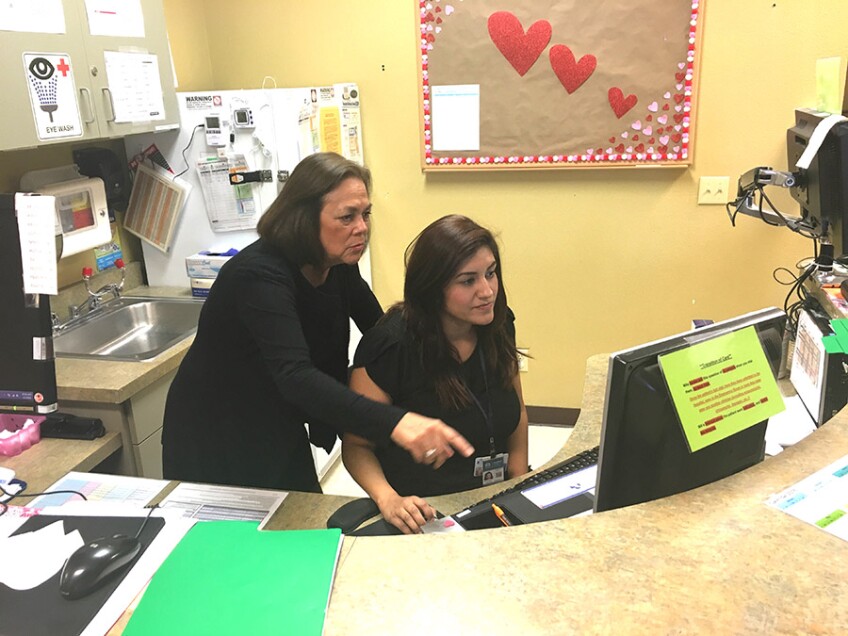Promotoras Guide Uninsured Coachella Valley Residents to Health Services
When Yesenia Ortiz met Maria, a few years ago, Maria was a short thin woman with dark hair and bright eyes that had started unexpectedly losing a significant amount of weight. At her thinnest, Maria, who was originally 115 pounds went down to 78 pounds. She was also experiencing pain and a burning sensation in her stomach and throat. In addition to worrying about her health, she also worried about being uninsured and not having access to care.
Which is why Ortiz, a certified enrollment counselor for healthcare services in the Eastern Coachella Valley, became so important to Maria. Ortiz helps applicants navigate through the county’s complicated process of accessing health care services, something that can be challenging for most people.
However, Ortiz’s work is more nuanced than just explaining forms or pointing people to the next line they should stand in. More than just an enrollment officer, Ortiz is also what is known as a promotora and plays an essential role in connecting immigrants with urgent health care services. Promotoras or “promotoras de salud” (Spanish for “health promoter”) are lay health-care advisers, traditionally within Latino communities.
To a large extent, in addition to guiding applicants through the application and enrollment process, the success of promotoras like Yesenia Ortiz relies largely on their cultural sensitivity to the significant Latino population that seek the services. By engendering credibility and trust within the community, their role is not only to give applicants information, but to bridge the needs of applicants with a county system that does not offer much or any assistance.
Ortiz and other members of the team at local non-profit Clinicas Salud Del Pueblo helped Maria enroll into the Medically Indigent Services Program (MISP). While MISP is not an insurance, it is meant to be used on an emergency basis and does not include prenatal, dental, or mental health services for adults between the ages of 21 and 64 and is only accepted at county health centers such as Clinicas Salud Del Pueblo where Ortiz is based.

The Medically Indigent Services Program, an emergency health services program is geared to some of Riverside County’s most vulnerable --low income residents that do not have health insurance coverage -- is particularly mired in complications. Moreover, in counties such as Riverside, MISP is one of the few services available to immigrant workers, including the undocumented. Currently there are 6,680 people enrolled in the program.
Like Maria, the applicants Ortiz works with in the Eastern Coachella Valley are largely immigrants that speak or read little to no English, some can’t read or write at all. Some are undocumented and are fearful of exposing themselves to government officials.
Ortiz has witnessed however, that despite these challenges, applicants finally come forward to access services when their health symptoms become intolerable, urgent. Often the process of seeking and acquiring help can seem almost equally unbearable.
“I used to cry a lot because I felt like I had nowhere to go” Maria said in Spanish. “It was very difficult for me, I would always pray and ask god for mercy.”
For Maria, having the assistance of experts such as Yesenia, readily available to assist her made experience in getting the care that she needed a lot easier.

Ortiz has noticed that like Maria, many of the applicants that she assists in the Eastern Coachella Valley often have difficulties accessing the program due to the fact that they live in isolated and rural communities. Many times, applicants do not have cars and rely on rides or on sparse public transportation.
“When applying for MISP here in the valley there is an application issue because most people that are applying to MISP are living in Mecca, Thermal or farther out east,” she said.
However, late in 2015 an MISP enrollment officer started going to Mecca on the fourth Monday of every month for a few hours, making it slightly easier for residents to apply and enroll in the program. Before then, most applicants from the east valley would have to travel to Indio to submit their application. While this has helped alleviate those in need, Ortiz says it is not enough.
“It would be nice if they had someone there all day,” Ortiz said. Clinicas Salud del Pueblo also provides free transportation to any of their sites. All patients have to do is call 24 hours in advance and a van will take them to and from their appointment.
If needed, members of the outreach team make house calls to help people apply for programs such as MISP.
In addition to lack of transportation potential applicants are often deterred from applying to MISP by the convoluted process and the lack of information about it. Ortiz said that some of the people applying don't know how to read or get easily confused by the complicated vocabulary. Promotoras always suggest that applicants come into the clinic or to call for assistance. This helps eliminate any complications that might come up during the application process.
Also, Ortiz and other Clinicas Salud del Pueblo staff are bilingual. All promotoras on the team speak both English and Spanish. “You understand more than the language, it is the culture,” Ortiz said. “You know where they are coming from.”
“It’s not just a job,” “we go beyond to see how we can help, we don't just limit ourselves to one topic.”
“Sometimes we’ll just give them our cell phone numbers that way they can call us and say this is what it is telling me to do,” she said.
Ortiz is ready to help even when she is off the clock. She recalled an instance when a woman knocked on her door at 11 p.m. seeking help for her 14 year-old daughter. The woman suspected that her daughter was developing a substance abuse problem.
“I was tired in the moment but after that I didn't feel tired anymore, it was a really rewarding sensation,” Ortiz said.
Then there’s the wait, with long periods between application steps, which can be very difficult for applicants with urgent or worsening ailments. “The first thing you have to do is apply to Medical and whether you’re approved or denied, you still have to apply to Medi-Cal. Depending on your income, sometimes you are approved. Sometimes since they are undocumented it gives them restricted Medical, which means that they can use it in case of an emergency,” Ortiz said.
It usually takes two to three weeks for applicants to hear back on a decision on Medi-Cal, from there it can take as long as 30 days to get an approval on MISP.

Though MISP is currently available in Riverside County, as well as several other counties throughout the state, local advocates continue to work raise awareness among residents who would most benefit from the program, and encourage them to enroll and utilize this program. Clinica de la Salud is not the only organization working to spread the word about MISP. The east valley chapter of Building Healthy Communities has also joined those efforts.
“I think we are in a place where we are showing that there is a big need,” Building Healthy Communities Eastern Coachella Valley director Silvia Paz said.
“At the community level, the challenges are that people don't have the transportation to get to places, language is a barrier as well.”
Paz has noticed that even after the passing of the Affordable Care Act, there is still a substantial need for the kind of services that MISP provides. She said that there is still a segment of the population that cannot afford healthcare.
“They just can’t pay for it,” she said.
Although residents of the eastern Coachella Valley face a unique set of issues in accessing the program, Paz has high hopes for its future and is doing her part to turn them into reality.
“It is really not advertised to the community that this service is available” she said. “We would like to see it be more robustly funded and staffed.”
As for Maria, she was granted full scale Medical in October of 2015 under a special circumstance clause and is now able to get all her treatment. Maria said that not enough people in the community know about the services that they may qualify for. She also acknowledges the importance of promotoras like Yesenia Ortiz in helping other like her.
“People don't know what is available so they don't go out to seek those resources,” she said.
Nonetheless, Ortiz and other promotoras continue to reach out, above and beyond their call of duty. “You change someone’s life, you never stop working and you start to realize how you change things in the community,” Ortiz said.



